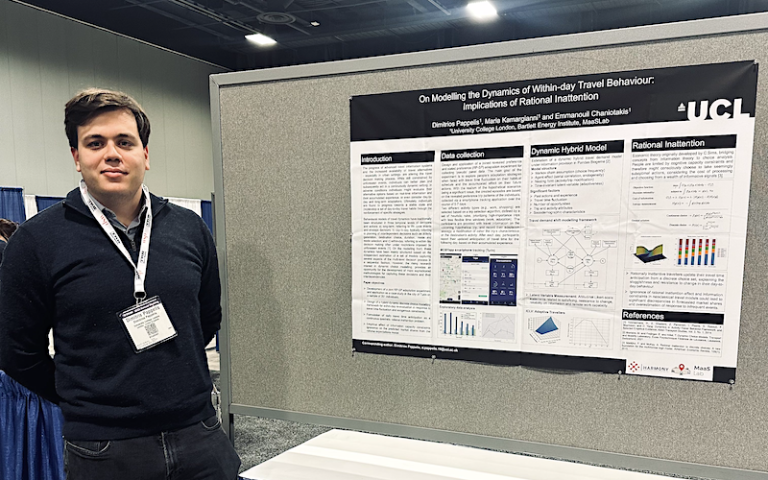Spotlight on Dimitrios Pappelis
12 February 2024
Learn more about the work of our new Research Fellow in Dynamic Travel Demand Forecasting and Network Modelling

Could you tell us a bit about your background?
I have an engineering background from the National Technical University of Athens, and I am a PhD researcher in transport modelling and data analytics at the Bartlett School of Environment, Energy and Resources. My research focuses on modelling travel demand and transport dynamics with the use of structural econometrics and machine learning. My thesis is entitled "Dynamic travel behaviour modelling: from neoclassical methods to rational inattention", and it aims to understand how different theoretical models of decision-making (e.g., rational expectations, bounded rationality) hold up against the complexities of real-world travel phenomena, such as inertia, day-to-day learning, and within-day re-evaluation. In parallel to my doctoral research in the UCL Energy Institute, I have worked as a Scientific and Technical Researcher in two major EU HORIZON projects, HARMONY and SYNCHROMODE. These projects have offered a more practical application of my research skills, contributing to broader initiatives in transport and mobility innovation.
What motivated you to study and work in your field of research?
I've always been fascinated by advanced quantitative methods and modelling under uncertainty. I found transportation to be the ideal interdisciplinary field for exploring these interests. It bridges the technical rigor of engineering, econometrics, and optimization with the human factor, incorporating elements of psychology and sociology. I personally find delving into urban planning, environmental impact, and even political and economic considerations very intriguing, attempting as it does to offer a holistic view of how societies move and function. Thus, working within a field where theoretical models and practical applications converge, allows for solving elegant, mathematical problems and then witness them evolve into real-world solutions that promote well-being and sustainable practices.
What amongst your (prior) research work best represents what you wish to contribute to the field
I would say my prior research work, on the study and interpretation of travel behaviour dynamics, would be my central contribution thus far. Specifically, I have explored the phenomena of inertia and resistance to change in travel behaviour and decision-making, viewed through the lens of information theory and rational inattention. Generally, it is grounded in the concept that individuals may intentionally select what appear to be suboptimal travel decisions, influenced by cognitive costs associated with the acquisition and processing of the wealth of available travel information (e.g., smartphone journey planners). I believe that this approach can advance our theoretical understanding of travel behaviour but also has practical implications in the design of transportation systems (e.g., pricing regulation, information provision). I was honoured to present parts of this work in esteemed research conferences (e.g., IATBR, TRB, hEART) and receive the first prize in the PhD competition of the Energy Institute in 2023.
Could you tell us about one of the current projects and/or collaborations you are working on in your Institute?
Currently, I am working as a researcher for the SYNCHROMODE project as a member of MUSALab at the Energy Institute. This project aims to develop a data driven toolbox for improving the management of transport operations from a multimodal perspective, in order to better manage the transport network as a whole. Essentially, it is envisioned to provide transport managers and operators with new predictive and network optimization tools for balancing the transport supply and demand. Their capabilities will be showcased via well-chosen case studies designed in a number of European cities in the coming period.
Who is influential to you and why?
Joining UCL as a researcher was a decision deeply inspired by the remarkable paths of two alumni, Demis Hassabis, and Prof. David Silver. Their journey from academia to the forefront of innovation with the establishment of DeepMind, resonates with my aspirations. Being a strong supporter of research and innovation-driven industry as a paradigm myself, I believe their trajectory is a prime example of the seamless transition of theoretical ideas and expertise into tangible, real world-applications. In addition, being a long-time chess competitor myself, I have always been captivated by how they revolutionized our approach to the game with the development of AlphaZero, in their drive to push the boundaries of reinforcement learning and artificial intelligence in general.
Outside of your research work, what are some of your interests or hobbies
Outside of my research, I am deeply engaged with strategy mind sports, both as a competitor and as a coach. I have been an international chess player for over 20 years, now also delving into contract bridge and poker. To an extent, this passion has also motivated my research direction, working towards multi-agent systems and decision-making under uncertainty. Noticing how both require a deep understanding of strategy, foresight, and the ability to identify optimal decisions from a multitude of candidate actions, the parallels between the two are striking and a continuous source of inspiration.
Image credit: Dimitrios Pappelis
 Close
Close

